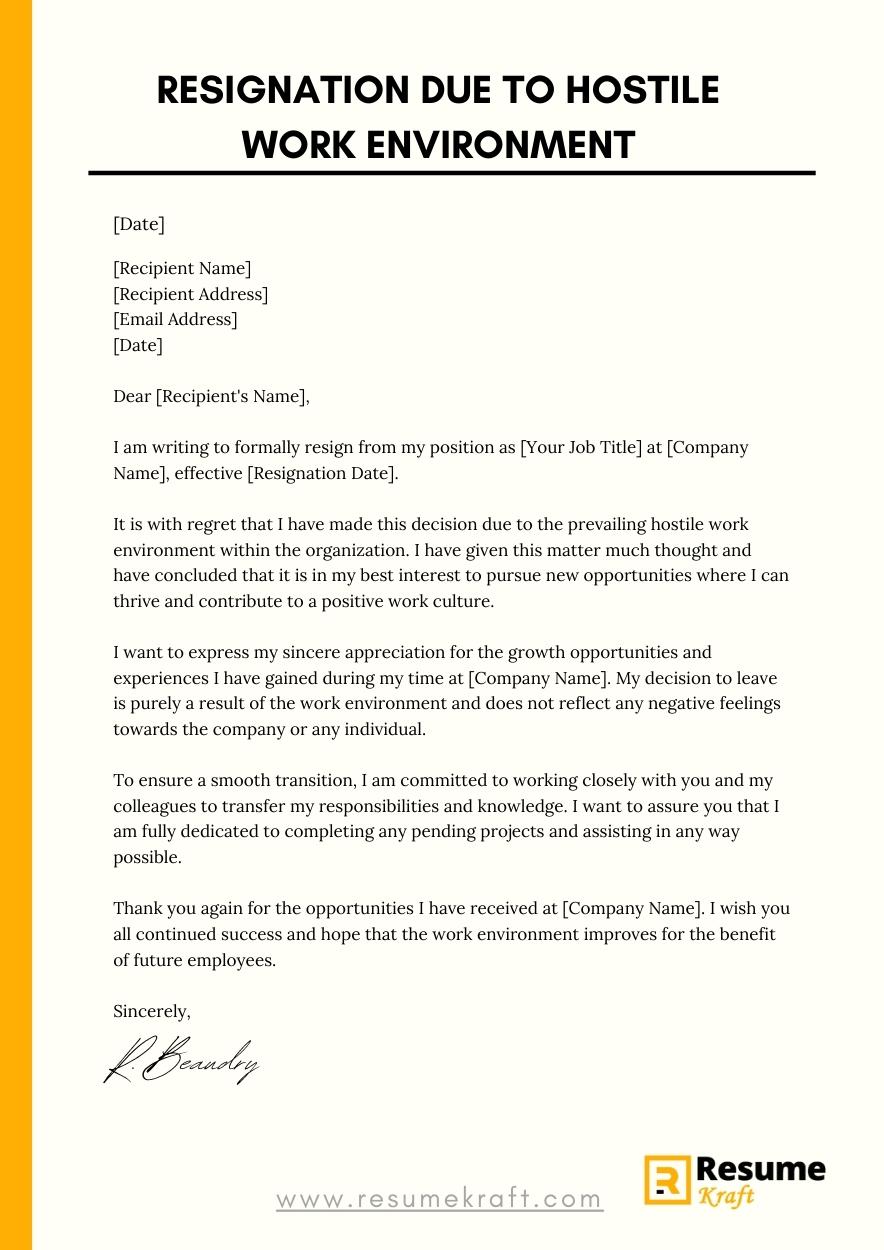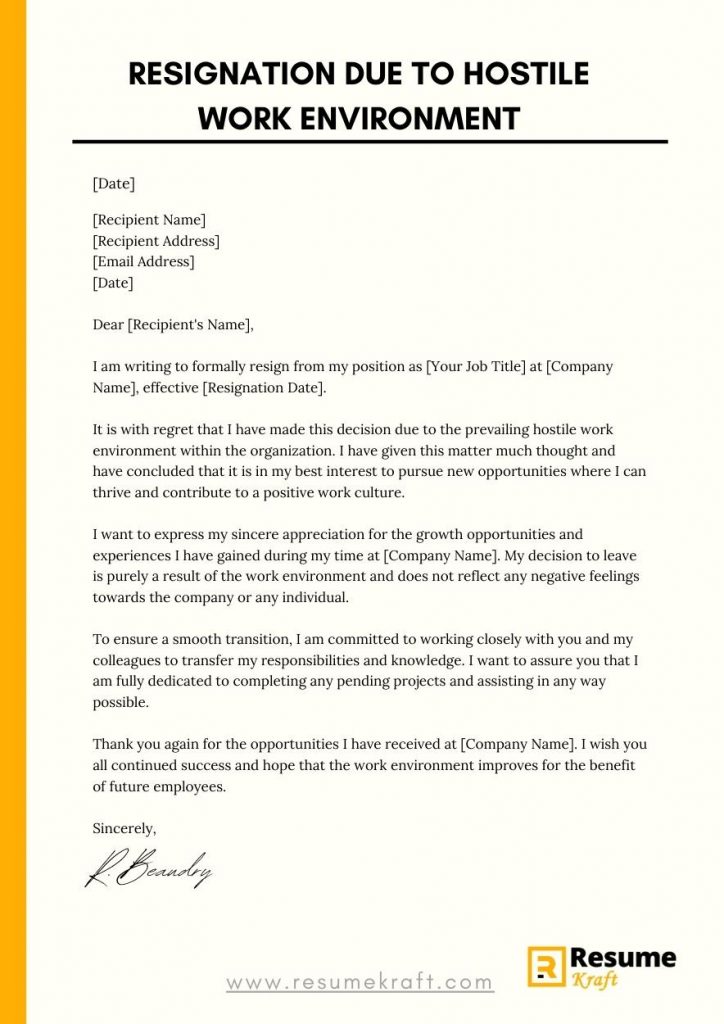
In a professional environment, an employee may sometimes find themselves working in a hostile work environment. If you are facing such a situation and have decided it’s time to move on, it is important to resign in a professional and respectful manner. Writing a resignation letter can be a daunting task, but this guide will provide you with all the necessary information and samples to help you craft a resignation letter due to a hostile work environment with ease.
Resigning from a job due to a hostile work environment can be a difficult decision. It is essential to maintain professionalism and express your concerns appropriately in your resignation letter. In this article, we will guide you through the dos and don’ts of writing a resignation letter in such circumstances, provide you with a format to follow, and offer samples to use as references.
What To Include in a Resignation Letter Due to Hostile Work Environment
When writing a resignation letter due to a hostile work environment, it is important to include the following key elements:
- Date and Contact Information: Begin your letter by including the current date and your contact information. This ensures that the recipient can easily reach out to you if necessary.
- Salutation: Address your letter to your immediate supervisor or the appropriate recipient. Use a professional salutation, such as “Dear [Supervisor’s Name].”
- Statement of Resignation: Clearly state your intention to resign from your position. Keep this section concise and direct to the point.
- Reason for Resignation: While you are not obligated to provide detailed reasons for your resignation, it may be useful to briefly mention that you are leaving due to a hostile work environment. Be tactful and professional when discussing this sensitive matter.
- Appreciation: Express gratitude for the opportunities provided and the experience gained during your tenure with the company. This shows your professionalism and leaves a positive impression.
- Transition Plan: Offer your assistance in transitioning your responsibilities to a new employee. This cooperative gesture ensures a smooth transition and maintains professionalism.
- Closing: End your resignation letter with a professional closing such as “Sincerely” or “Best regards,” followed by your full name and signature.
What Not to Include in Your Resignation Letter
In a resignation letter due to a hostile work environment, it is important to avoid including any negative or confrontational content. Here are some things you should not include in your resignation letter:
- Personal Attacks: While you may have encountered difficult individuals in your workplace, avoid personal attacks or negative comments about specific individuals or the company as a whole.
- Detailed Explanations: You do not need to go into extensive detail about the specific incidents or reasons for the hostile work environment. Keep your resignation letter focused, professional, and concise.
- Threats or Ultimatums: It is important to maintain a professional demeanor throughout the resignation process. Avoid making threats or ultimatums, as it can reflect poorly on your reputation.
- Gossip or Speculations: Stick to the facts and avoid engaging in office gossip or speculations about the reasons behind the hostility. Such discussions are unprofessional and will not add value to your resignation letter.
- Negativity: Maintain a positive tone throughout your letter. Focus on expressing appreciation for the opportunities you have had and the skills you have gained.
How To Format a Resignation Letter Due to Hostile Work Environment
When formatting your resignation letter due to a hostile work environment, it is important to follow a professional and standard format. Here is a suggested format to consider:
- Your Contact Information
- Full Name
- Address
- City, State, ZIP Code
- Phone Number
- Email Address
- Date
- Recipient’s Contact Information
- Full Name
- Job Title
- Company Name
- Address
- City, State, ZIP Code
- Salutation
- Dear [Supervisor’s Name],
- Statement of Resignation
- Start by clearly stating your intention to resign from your position, including the effective date of your resignation.
- Reason for Resignation
- Briefly mention that your decision to resign is due to a hostile work environment. Focus on maintaining professionalism and avoid excessive detailing or negative language.
- Appreciation
- Express your gratitude for the opportunities provided and the support you received during your employment.
- Transition Plan
- Offer your assistance in transitioning your responsibilities to ensure a smooth handover process.
- Closing and Signature
- End your letter with a professional closing, such as “Sincerely” or “Best regards,” followed by your full name and signature.
Resignation Letter Example:

Printed Resignation Letter Sample
Dear [Supervisor’s Name],
I am writing to formally resign from my position as [Your Job Title] at [Company Name], effective [Resignation Date].
It is with regret that I have made this decision due to the prevailing hostile work environment within the organization. I have given this matter much thought and have concluded that it is in my best interest to pursue new opportunities where I can thrive and contribute to a positive work culture.
I want to express my sincere appreciation for the growth opportunities and experiences I have gained during my time at [Company Name]. My decision to leave is purely a result of the work environment and does not reflect any negative feelings towards the company or any individual.
To ensure a smooth transition, I am committed to working closely with you and my colleagues to transfer my responsibilities and knowledge. I want to assure you that I am fully dedicated to completing any pending projects and assisting in any way possible.
I would like to express my gratitude to the entire team for the support and collaboration over the years. Despite the challenges, I have learned valuable lessons and developed skills that will benefit me in future endeavors.
Please let me know if there is anything specific I can do to facilitate the transition. I will be available to discuss any handover process or answer any questions until my last day of work.
Thank you again for the opportunities I have received at [Company Name]. I wish you all continued success and hope that the work environment improves for the benefit of future employees.
Sincerely,
[Your Full Name]
[Your Signature]
Email Resignation Letter Example:
Subject: Resignation Letter – [Your Name]
Dear [Supervisor’s Name],
I hope this email finds you well. I am writing to formally resign from my position as [Your Job Title] at [Company Name], effective [Resignation Date].
Regrettably, I have reached this decision due to the ongoing hostile work environment, which has impacted my emotional well-being and overall job satisfaction. After careful consideration, I have decided that it is in my best interest to explore new opportunities in a healthier work environment.
I want to take this opportunity to express my appreciation for the opportunities and experiences I have gained during my time at [Company Name]. Though the work environment has been challenging, I have learned valuable lessons that I will carry forward in my professional journey.
To ensure a smooth transition, I am committed to completing any pending projects and assisting with any handover process. Please let me know how I can be of help during this period.
I am confident that with your leadership, the team will continue to succeed. I wish you and the entire team all the best in your future endeavors.
Thank you for your understanding and support.
Best regards,
[Your Full Name]
Key Takeaways
- Resigning from a job due to a hostile work environment requires professionalism and tact.
- Include the necessary elements such as date, contact information, clear statement of resignation, brief mention of the reason, appreciation, transition plan, and professional closing.
- Avoid negative language, personal attacks, or detailed explanations of incidents.
- Maintain a positive tone and show gratitude for the opportunities received.
- Offer assistance to ensure a smooth transition.
- Use a standard format for your resignation letter and tailor it to your specific circumstances.
Frequently Asked Questions
Can I mention specific incidents or people in my resignation letter?
It is generally advised to avoid mentioning specific incidents or people in your resignation letter. Focus on expressing your decision to resign due to the overall hostile work environment rather than singling out individuals or incidents.
Should I provide a detailed explanation of the hostile work environment?
While you should mention that the hostile work environment led to your decision to resign, it is not necessary to provide a detailed explanation. Keep your resignation letter concise and professional, avoiding excessive details.
Can I express my dissatisfaction with the work environment in my resignation letter?
You can mention that you are resigning due to a hostile work environment, but it is important to maintain professionalism and avoid expressing excessive dissatisfaction or negative opinions in your letter. Keep the tone respectful and concise.
How can I offer assistance during the transition period in my resignation letter?
Express your willingness to help with the transition process by offering your assistance in transferring your responsibilities to a new employee. This cooperative gesture shows professionalism and ensures a smooth handover.
Should I communicate my resignation in person before submitting a resignation letter?
It is generally advisable to have a conversation with your supervisor or HR representative before submitting your resignation letter. This allows for a proper discussion and ensures that your resignation is handled professionally.
Conclusion
Resigning from a job due to a hostile work environment can be challenging, but it is important to handle the situation with professionalism. By following the guidelines and using the provided samples, you can craft an effective resignation letter that conveys your decision while maintaining a respectful tone. Remember to focus on gratitude, offer assistance during the transition, and keep your letter concise and professional.

